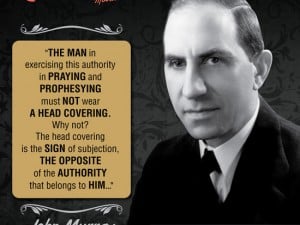What’s More Important Than Head Covering?

Introduction
“Religious headcoverings” is one of those topics that can trigger a variety of strong emotions & opinions.
Some folks are adamantly against the use of headcoverings for themselves and others. And some folks make headcovering the defining feature of their faith, such that wearing a headcovering becomes part of their identity.
Some churches practice headcovering due to a strong denominational tradition or a careful study of Scripture. But other churches consider headcovering to be so irrelevant that it’s not even worth a serious consideration of the passage that promotes it (1 Corinthians 11:2-16).
So where is the balance?
The Bigger Issue
I serve in full-time ministry and I see 1 Corinthians 11 as being applicable today — but I rarely bring up the topic of headcovering with others. Why? Because there are dozens of theological truths that have greater importance. As presented in Scripture, the Christian walk includes so much more than the practice of headcovering.
And yet we must always seek to be balanced. Part of the reason I’ve invested many hours researching & writing about Christian headcovering is because there is an overall imbalance to correct. Compared to the other biblical symbols & practices, headcovering hasn’t received sufficient teaching in Christian circles, coverage in modern Christian literature, and follow-through in Christian society.
What’s More Important
However, when something is out of balance, it can be tempting to over-correct. Therefore, it is important to remember that there are many things that deserve more of our passion than headcovering. Here are some of them…
1. The Other Two Biblical Symbols: The Lord’s Supper & Baptism. A few chapters after explaining the practice of headcovering, the Apostle Paul reviews the Gospel. He states that the Gospel is of “first importance” (1 Corinthians 15:3ff), which is a very significant & exclusive statement.
Among the symbolic practices (or “ordinances“) found in Scripture, we have two that point directly to the Gospel. Specifically, the Lord’s Supper (or “Communion”) symbolizes what Christ did on the cross (dying as a sacrificial penalty for our sins). Baptism represents our response (as we profess faith and publicly identify ourselves with Jesus).
So, while headcovering can be considered a biblical “ordinance” (1 Corinthians 11:2ff, KJV) along with baptism and the Lord’s Supper, the Gospel-related symbols are more significant.1) Along the same lines, note that Paul’s consequence for not wearing a headcovering is nowhere near as severe as the possible consequences for dishonoring the Lord’s Supper (1 Corinthians 11:6, 27-30). Headcovering symbolizes truths that are important to understand (see next section), but the truths behind Communion are so important that without them we are eternally separated from God.
2. The Meaning Behind the Symbol. By definition, any symbol is less important than what it symbolizes. For example, my wedding ring is less important than my marriage. Baptism is less important than being saved. My flag is less important than my country. And headcovering is less important than “God’s glory” and “biblical marriage roles.”
Put another way, employing a symbol (such as a wedding ring or a flag) shows our devotion to what the symbol stands for. Any significance that the symbol has is due only to the original significance of whatever it symbolizes. We should be a bigger supporter for what’s behind the symbol than for the symbol itself.
When the reverse happens, legalism is following close behind. And practicing the symbol without practicing what it symbolizes is hypocrisy.
This all becomes even more clear when we take it one step further… I can be saved without being baptized. If I lose my wedding ring, I’m still married. A country doesn’t need a flag in order to be a country. And so the husband is still the “head” even if he wears a hat while he prays. His wife can still be following his lead, even if she doesn’t wear a headcovering.
Of course, this doesn’t imply that the symbol has no value. I wouldn’t dream of throwing away my wedding ring. Likewise, Paul says that it’s a “disgrace” for men & women to ignore his God-inspired headcovering commands (1 Corinthians 11:4-5). It’s just that the principles behind the headcovering are more important than the headcovering itself.
3. Orthodoxy & Orthopraxy. Not every topic & command in the Bible is equal (Matthew 5:19, 23:23). There are some that play a more central role in our lives, and a great number of other biblical doctrines & practices are more important than headcovering. Jesus taught us that “loving God” is the “first and greatest commandment” (Matthew 22:37-38, NIV). “Loving others” is ranked second (Matthew 22:39). Similarly, if the Gospel is of “first importance,” then spreading it (the Great Commission, Matthew 28:18-20) is surely one of the most important things we can do.
Beliefs such as “the Bible is true” and “God loves me” and “Jesus is God’s Son” are much more foundational, eternal, and life-changing than Paul’s command that “she should cover her head.”
Conclusions
In the grand scheme of things, are Paul’s instructions about headcovering really even worth concerning ourselves with?
Yes — because they are an inspired part of Scripture, and are given as a command. Any instruction in the Bible is a weighty matter, since it is given to us by Almighty God. Though “headcovering” isn’t the most central topic in the Bible, obedience is still important because it’s part of how we express our love for God (John 14:15) and because the symbol is meaningful.
And in our contemporary Christian culture, this obedience needs a boost.
However, headcovering is just one part of a much larger picture. The broader view of Christianity also includes the Gospel-oriented symbols, the meaning behind headcovering, and the foundational truths of Scripture. Each of these is more important than headcovering.
The Christian life is a balancing act. May the Lord grant grace to His people to prioritize the most important pursuits “without neglecting the others” (Matthew 23:23).
References
- Church-Only Covering: Re-Evaluating the Best Arguments - February 12, 2024
- Covering Beyond Sunday Morning? - December 9, 2023
- Head Covering and the City of Corinth: An Introduction to Corinth - January 12, 2023



